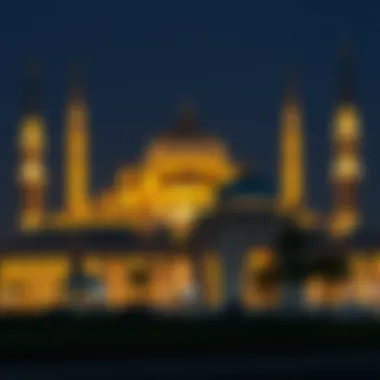Understanding Ramadan's Impact in the UAE for 2023


Intro
Ramadan, the holy month of fasting, is not just a spiritual time for Muslims around the globe; in the UAE, it resonates through the very fabric of society. The essence of Ramadan encapsulates reflection, community, and generosity. As we enter 2023, it brings with it fresh insights into how everyday life is transformed during this month in a culturally rich nation.
In this article, we will explore the multifaceted impact of Ramadan in the UAE, particularly for investors and homeowners eyeing the vibrant market of Dubai. This deep dive will unveil trends in real estate, the ways business dynamics shift, and how community engagement flourishes. The implications of Ramadan extend well beyond just personal observance; they create a ripple effect that influences various sectors, especially for those considering investments or relocations.
As the sun sets each day during this sacred month, the bustling city takes on a different character. It's as if a gentle curtain drops over the usual chaos, and the atmosphere softens. Restaurants fill with life as people gather to break their fast, transforming lines and waiting lounges into lively hubs of dialogue and sharing. The spirit of Ramadan fuels economic activity in ways that few understand, especially for those looking to plant roots in this land of opportunity.
Moreover, understanding the nuances of Ramadan's effect on daily life can offer an edge. For investors pondering the market landscape in this period, several trends warrant discussion—trends that reveal the pulse of the city amidst the rich tapestry of tradition.
As we delve deeper into this guide, we will touch on key market trends impacting real estate and explore the evolving implications for culture, societal norms, and investment strategies.
Ramadan Overview
Ramadan holds immense significance in the cultural and spiritual fabric of the UAE. It is a time when millions of Muslims engage in fasting, spiritual reflection, and community bonding. This comprehensive overview addresses the deeper meanings and implications surrounding the holy month. Understanding Ramadan is crucial, especially for those interested in investing or settling in the UAE, as it impacts daily life, business practices, and social interactions.
Historical Context
The origins of Ramadan trace back to the early days of Islam in the 7th century. It is believed to be during this time that the Quran was revealed to the Prophet Muhammad, establishing the month as one of immense spiritual importance. The tradition of fasting during Ramadan is rooted in the teachings of the Quran, which describes the act as a means of self-discipline and a way to cultivate empathy for those in need.
Throughout history, the observance of Ramadan has evolved. Initially marked by profound reflection and prayer, it also became a period that encouraged charity and community support. In the UAE, the historical significance of Ramadan is reflected in the way communities come together, often transforming town squares and mosques into centers of congregation, prayer, and reflection. The local culture embraces these traditions, fostering a sense of connection among both Emiratis and expatriates.
Cultural Significance
The cultural significance of Ramadan in the UAE transcends mere fasting from dawn until dusk. It is a holistic experience that intertwines spirituality with communal affairs. Fasting serves not only as a religious obligation but also as a practice that strengthens social ties through shared meals known as Iftar, where families and friends gather to break their fasts together.
During this month, the atmosphere in the UAE shifts noticeably. Streets become adorned with decorative lights, and shops often extend their hours, catering to the unique demands of the month. Restaurants may offer special Iftar menus, showcasing local cuisine as well as culinary delights from around the world. Events, cultural festivals, and art exhibitions also feature prominently, enhancing the community's sense of belonging.
"Ramadan is a time for reflection, a chance to deepen spiritual connections and embrace the values of compassion and charity that lie at the heart of Islam."
While the external celebrations are vibrant, the internal journey of spiritual growth remains paramount. Practices such as increased prayer and Quran recitation permeate everyday life during this month. The culture surrounding Ramadan emphasizes self-restraint, humility, and compassion, all of which shape the social dynamics not only of individuals but also of communities at large. This layered cultural landscape makes Ramadan a significant event, not just for religious observance, but as a potential draw for those looking to invest in understanding the UAE’s rich traditions.
Ramadan Dates for
Understanding the Ramadan dates for 2023 is essential for anyone living in or engaging with the UAE, whether you are an investor, property manager, or simply someone wanting to honor the community's traditions. Ramadan not only marks a period of spiritual reflection but also influences various sectors including business operations, social gatherings, and even property activities. With its fluctuating dates determined by the lunar calendar, there's no fixed schedule, making it crucial to stay informed about the expected dates for this significant month.
Start and End Dates
In 2023, Ramadan is anticipated to start on the evening of March 22 and conclude with the Eid al-Fitr celebration on the evening of April 21. These dates can shift slightly depending on the moon sighting. Knowing the start and end dates is critical because they guide daily routines like fasting, prayer times, and social interactions. Businesses often adapt their working hours and schedules during this time. For instance, many companies may have reduced work hours, typically shifting to later in the day.
Eid al-Fitr Celebrations
Eid al-Fitr marks the end of Ramadan and is celebrated with much enthusiasm across the UAE. Expected on April 21, 2023, the holiday is a time for family gatherings, festive meals, and lively community events. Notably, it is a public holiday in the UAE, leading to city-wide celebratory activities.
During Eid, many families indulge in special dishes that highlight local flavors, such as harees, fattoush, and a variety of sweet delicacies. It’s common for people to engage in charitable giving during this period, initiating practices like Zakat al-Fitr, which ensures everyone enjoys a festive meal.
As an observer, or if you're considering entering the UAE market around this time, understanding the festive spirit and typical customs can pave a smoother path for community engagement. Eid al-Fitr serves as a reminder of generosity, unity, and appreciation, providing a unique environment that can significantly impact business relationships.
"The month of Ramadan is not just about fasting, but about fostering a spirit of compassion and community, making Eid a much-anticipated occasion."
Eid festivities often include public prayers held in large congregations, followed by communal celebrations. For prospective investors or property owners, this period presents opportunities for networking and establishing connections within the local community. Social events and gatherings during Eid can be vital for building relationships that support business ventures.
By staying attuned to these essential dates and their cultural context, you can navigate the local landscape with greater insight, ensuring that you seize the opportunities that Ramadan and Eid al-Fitr present.
Observances During Ramadan
The essence of Ramadan in the UAE transcends mere fasting; it embodies a rich tapestry of traditions and practices that collectively enhance the spiritual atmosphere of the community. Understanding these observances is paramount, not just for expatriates and newcomers, but also for investors and property managers navigating the cultural landscape during this period. These observances shape daily routines, influence consumer behavior, and affect business dynamics across sectors.
Fasting Practices
Fasting during Ramadan, or sawm, holds a special place in the heart of Islamic practice. It’s not just about abstaining from food and drink from dawn till dusk; it’s a time for inner reflection and spiritual growth. For many, the fast is broken with a meal called iftar, traditionally starting with dates and water, followed by lavish spreads that showcase culinary diversity across the UAE.
But the practice of fasting serves more than one purpose. It fosters a sense of empathy towards those who struggle with hunger, encouraging acts of charity and community bonding. For expatriates and investors, understanding the significance of this fast can inform better business practices and enhance relationships with local colleagues and clients. Here are a few important points about fasting:
- Health Benefits: Many discover that fasting helps reset their bodies and minds. Adjusting to a different eating schedule can promote healthier habits.
- Community Engagement: Businesses may wish to adapt their offerings to appeal to customers observing the fast, creating special iftar menus or promotions that resonate with local traditions.
- Consideration for All: Work environments may shift their hours to accommodate those fasting, emphasizing the need for flexibility in daily routines.


Prayer and Reflection
Prayer, or salat, is paramount during Ramadan, with increased participation in communal prayers, particularly the evening Taraweeh prayers held in mosques. These congregational gatherings serve as a reminder of the collective commitment to faith and community. Many choose this time for heightened introspection, diving deep into their spiritual practices through reading the Quran and engaging in quiet reflection.
For investors and potential homeowners, this represents an opportunity to connect with the local populace. Real estate professionals might find that community events hosted in mosques or local centers during Ramadan can serve as informal networking opportunities.
Also, consider these aspects:
- Increased Spirituality: Many find that this period deepens their faith, offering a fresh perspective that extends beyond religious practices.
- Social Interactions: Ramadan evenings often transform into vibrant community spaces as families and friends gather after iftar. This culturally rich environment enhances one's understanding of local customs and facilitates relationships.
- Mindset Shift: Investors should be mindful that certain transactions may slow down during this period; however, it also opens avenues for businesses that align with the cultural sentiments of the season.
"Ramadan isn't just a month of fasting; it’s a comprehensive experience rich with meaning that creates bonds and reflects shared values."
By recognizing and respecting the common observances of Ramadan, stakeholders in the UAE—from local businesses to international investors—can navigate this special month with a deeper understanding and appreciation. Engaging sympathetically with these observances not only enriches community relations but may also lead to fruitful business opportunities.
Impact on Daily Life in the UAE
Ramadan is not just a month of fasting; it profoundly influences the daily life, sentiments, and routines of residents in the UAE. As the country embraces this holy month, various aspects of life face adjustments and transformations. For investors and expats, understanding these changes provides insights into the cultural fabric that defines the UAE, as well as the commercial landscape during this time. People might experience this month in unique ways but often share an underlying respect for the traditions and practices associated with it.
Changes in Work Schedule
During Ramadan, many workplaces experience a shift in their operational hours. Typically, office schedules are shortened, usually ranging from 9 AM to 3 PM or even less depending on the organization. This adjustment aims to accommodate those who are fasting, minimizing productivity losses caused by hunger or fatigue throughout the day.
Employees are expected to manage their workload efficiently within this reduced timeframe. For expatriates who are new to the region, adapting to these changes might require some flexibility, as it can affect project timelines or deadlines.
Considerations for business owners include:
- Understanding New Norms: Managers should communicate clearly about work expectations and possible changes in meeting times.
- Employee Well-being: Providing flexible hours during this month can promote better morale among staff.
- Client Interactions: Establishing updated business hours before Ramadan starts helps maintain customer relationships; after all, it’s crucial to adjust expectations around responsiveness.
Shopping and Dining Adjustments
As the sun sets each day, a vibrant shift occurs in the shopping and dining culture. In the UAE, nightly iftar gatherings—when families break their fast—become central to community life. Traditional dining spots and shopping venues may extend their hours while also offering special services and promotions to attract customers.
Many restaurants open their doors for iftar to provide sumptuous buffets filled with traditional dishes. It is a vibrant time in places like Dubai’s Al Seef area or Abu Dhabi’s Corniche, where the atmosphere is electric with people enjoying meals together. Similarly, supermarkets and grocery stores stock up on traditional foods, ensuring that families have access to items that are popular during Ramadan.
Additionally, it is crucial for businesses to establish the right tone in their marketing by highlighting their Ramadan offers respectfully. Using local customs, such as Arabic greetings, can enhance connection with potential customers.
"A little awareness and sensitivity towards cultural habits can go a long way for businesses during Ramadan."
For investors looking into retail or food sectors, understanding shopping patterns during this time—like increased demand for certain products—can be a unique advantage. Furthermore, they should take into account that nightlife often flourishes during Ramadan, with many locals and tourists dining out or visiting markets late into the evening.
Overall, Ramadan transforms the fabric of daily life in the UAE, adjusting work routines and enhancing community connections through shopping and dining. Understanding these shifts not only aids in navigating the landscape more effectively but also shows a commitment to respecting the local culture.
Social and Community Activities
During Ramadan, social and community activities transform the atmosphere of the UAE into one of unity, spirituality, and generosity. This is not just a time for individuals to fast or pray, but a dynamic period that sees communities coming together through various forms of engagement. The activities that unfold during this month foster a sense of belonging among residents, which is especially vital in a culturally diverse nation like the UAE.
Charity and Giving
One of the most significant aspects of community activities during Ramadan is the emphasis on charity, which is deeply rooted in Islamic teachings. Charity, or Zakat, plays a key role in the lives of Muslims, and Ramadan serves as a primary catalyst for giving. It's common for individuals to offer monetary donations or in-kind support to local charities, food banks, and residents in need. The spirit of generosity is almost palpable, and non-Muslims often find ways to contribute as well, fostering an inclusive environment.
Noteworthy initiatives arise during this period that focus on helping those less fortunate. Some prominent charities, like the UAE Red Crescent Authority and Dubai Cares, coordinate special Ramadan campaigns to distribute food packages or provide financial assistance to struggling families. Many businesses, too, take the opportunity to set aside a portion of their profits for charitable causes, which not only enhances their social responsibility but also warms the hearts of their patrons.
"During Ramadan, giving isn’t just about making a donation; it’s about creating a community where everyone can thrive."
Community Iftar Events
Iftar, the meal that breaks the daily fast, is an event that becomes a focal point of community bonding during Ramadan. Community iftar events are abundant, showcasing the welcoming nature of Emirati culture. These gatherings often span across mosques, parks, and community centers, inviting individuals from all walks of life to partake in the meal together.
Organizations, local governments, and private businesses commonly host these events, providing not just food but a chance for dialogue, friendship, and cultural exchange. For expatriates in particular, these events serve as a bridge to understanding local customs, and a significant opportunity to meet new people and build networks.
A notable example is the annual iftar tent setups across Dubai, where meals are provided free of charge each evening. These places burgeon with families and friends, filled with laughter and conversation.
Additionally, some communities create “Iftar on the Move” initiatives, putting food trucks on the streets for those who may not have the means to attend large gatherings. This not only ensures that everyone has access to a meal but strengthens community ties.
In summary, social and community activities during Ramadan in the UAE highlight a unique blend of tradition, generosity, and unity. The focus on charity and the shared experience of Iftar not only enrich the lives of those who participate but also reinforce a strong sense of community, creating bonds that last well beyond the holy month.
For more resources on community activities and charitable giving during Ramadan, you can visit UAE Red Crescent Authority or Dubai Cares.
You can also check discussions and related content on platforms like reddit.com and Facebook groups tailored to cultural experiences in the UAE.


Ramadan's Influence on Real Estate
During Ramadan, the real estate landscape in the UAE experiences distinct shifts, influencing both market dynamics and investor behavior. Understanding these changes is crucial for anyone engaged in the real estate sector—from investors and property managers to buyers looking for new homes. This segment delves into how Ramadan plays a pivotal role in shaping market trends and investor sentiment in the region.
Market Trends During Ramadan
Throughout Ramadan, the property market may seem somewhat understated compared to the bustling activities seen during other months. One must consider that many individuals are focused on fasting and spiritual practices, leading to a temporary slowdown in transactions. Nonetheless, this does not imply a complete standstill. Typically, property viewings and open houses are less frequent during daylight hours, with people preferring to engage in these activities after iftar.
Traditionally, the month often witnesses an uptick in promotional offers from real estate developers eager to attract potential buyers who may still be in the market. For those pondering investments, it is a good opportunity to take advantage of lowered prices or attractive payment plans. Save for the conventional dips, Ramadan can also pave the way for unique opportunities. The period often sees various community events that draw attention to residential areas, with many appreciating the values of community living.
- Lower Demand: Many families tend to restrain from making significant financial decisions during this month, which can lead to a softened demand.
- Promotional Offers: As mentioned, developers might roll out enticing deals, making the month favorable for bargain hunters.
- Delayed Transactions: Post-Ramadan, one can expect a surge in activity as people return to the market with renewed fervor.
In a nutshell, while Ramadan brings about a different rhythm in the property market, the strategic investor can find value amid the calm.
Investor Sentiment
Ramadan has a profound effect on investor sentiment that is often underappreciated. The month encourages reflection and may influence buyer behavior more than one may expect. During this time, many aspire to do good, including charitable actions.
Investors may feel a moral imperative to contribute positively to the community, which can guide their investment choices. They might lean towards properties that not only promise a return on investment but also foster community spirit. This shift in sentiment may also encourage a preference for eco-friendly or socially responsible developments.
Moreover, with economic stability being a key concern, investors keep a keen eye on Ramadan's influence on activity levels. Here's what often characterizes investor sentiment during this holy month:
- Cautiousness: A measure of restraint is common as buyers tend to discuss and weigh options rather than act impulsively.
- Long-term Orientation: Investors look for long-term value rather than quick returns, assessing how properties perform in the context of community needs.
- Interest in Community Developments: There’s often an inclination towards projects that promise not just a return but also enhance the living experience within the community.
In summary, while Ramadan may constrict activity in the real estate sector, it is also a time for profound consideration. Investors can strategically align their choices with the values upheld during the holy month, positioning themselves for future success.
"Ramadan reinforces a sense of community, leading investors to seek properties that foster connection and positive living experiences."
Ultimately, comprehending Ramadan’s influence on real estate opens up pathways for investors and buyers alike, enabling them to navigate the market with a more informed perspective.
Property Management Considerations
Property management during Ramadan comes with its own set of unique challenges and opportunities. For investors, buyers, and property managers, understanding how the Ramadan period affects tenant relations and property viewings is crucial. It’s more than just a fleeting holiday; it influences the way business gets done.
Tenant Negotiations
When you think of Ramadan, the first thing that likely pops into mind is fasting. However, it also affects the expectations of tenants and landlords alike. Many tenants might be looking to either renegotiate their leases or seek certain concessions during this holy month. The spirit of generosity is prevalent during Ramadan, and residents often expect flexibility regarding payment timelines or other lease terms.
Landlords need to be mindful of their tenants’ needs, especially since Ramadan is a time when many are focused on family and community. Not just that, with the hustle and bustle of the season, a little leeway can go a long way in maintaining good relations.
Key considerations for tenant negotiations include:
- Payment Flexibility: Tenants may request adjusted payment schedules due to expenses incurred from Ramadan festivities.
- Improved Communication: Open dialogue helps in understanding tenant concerns and adjusting terms where feasible.
- Incentives: Offering incentives like reduced rates for early payments can seal a deal and ensure satisfaction.
By being accommodating, property managers can foster loyalty and trust, effectively strengthening tenant retention rates even beyond Ramadan.
Property Viewing Schedules
Scheduling property viewings during Ramadan requires finesse. With altered daily routines due to fasting, it’s not uncommon for potential renters or buyers to struggle to find time to view properties. The evenings become prime time for gatherings and meals, meaning viewing times will largely shift.
To optimize opportunities for engaging with prospective clients, consider the following strategies:
- Evening Viewings: Schedule viewings post-iftar, when people are more likely to be available and relaxed.
- Limitations on Morning Appointments: Mornings might not be the best time, as many are focused on their personal observances.
- Virtual Tours: In today’s tech-savvy age, offering virtual tours can save time and provide convenience to busy clients standing between meals and community activities.
In essence, adapting to the unique rhythms of Ramadan can provide better engagement with prospects, ensuring smoother transactions during a period that otherwise could lead to challenges.
“The wise property manager will pivot and adapt, turning potential obstacles into viable pathways for success.”
Understanding these elements creates a robust framework for property management throughout Ramadan. It’s not simply a matter of maintaining property but cultivating an environment that resonates with the cultural significance of this special month.
Relocation Insights for Expatriates
Relocating to the UAE during Ramadan presents unique opportunities and challenges for expatriates. Understanding the local customs, cultural practices, and the general atmosphere of the country during this holy month becomes crucial for a smooth transition.
Adapting to Local Customs
For newcomers to the UAE, Ramadan is a period where the local culture shines, offering a deeper understanding of Islamic traditions. It's not just about fasting; it embodies a time for reflection, community, and spirituality.


Here are some important customs to embrace:
- Fasting: While expatriates are not obliged to fast, they are encouraged to respect those who do, particularly by refraining from eating or drinking in public during daylight hours. This small gesture goes a long way in showing respect to the local population.
- Iftar: Participate in Iftar, the meal that breaks the fast at sunset. It's not uncommon for families to invite friends, neighbors, or even colleagues to join in. Accepting these invitations can foster relationships and create a sense of belonging.
- Dress Code: Dressing modestly is more important than ever during Ramadan. Light, loose-fitting clothing that covers shoulders and knees is both respectful and comfortable.
In summary, adapting to these customs is not just about fitting in; it's about demonstrating an appreciation for the culture, which can help expatriates develop connections with the local community.
Cultural Integration Opportunities
Ramadan provides a rich tapestry for cultural integration, allowing expatriates to immerse themselves in the UAE's traditions and practices. Some avenues for cultural integration include:
- Community Events: Many local organizations and mosques hold community gatherings during Ramadan. These events often include lectures, discussions, and activities that offer insights into Islamic teachings and practices.
- Learning about Islam: Ramadan is an ideal time for expatriates to learn more about Islam, its principles, and its significance. Numerous resources, including workshops and seminars, can be found throughout the UAE.
- Volunteer Opportunities: Engaging in volunteer work during Ramadan can be incredibly rewarding. Many organizations, such as the Dubai Islamic Affairs and Charitable Activities Department, seek volunteers for community service projects, particularly those that focus on charity and helping the underprivileged.
Participating in these activities not only enriches one's personal experience but also helps bridge cultural gaps and enhances understanding between different communities.
Cultural integration during Ramadan can pave the way for lasting friendships and a deeper appreciation of the UAE's rich heritage.
Ultimately, for expatriates, Ramadan is more than just a month of fasting; it presents a unique opportunity for growth, understanding, and creating meaningful connections within the UAE's vibrant society.
For more insights into the cultural landscape during Ramadan, you may refer to resources like Wikimedia or Britannica.
Challenges During Ramadan
Observing Ramadan in the UAE presents a wealth of cultural richness and spiritual perspective, yet it’s not without its challenges. This section delves into some of the key difficulties faced during this holy month, particularly focusing on health-related issues and travel complications. Highlighting these aspects not only enriches the understanding of Ramadan’s impact but also helps inform stakeholders like investors and expatriates about the practical considerations associated with moving or working here during this time.
Health Considerations
Fasting during Ramadan involves abstaining from food and drink from dawn until sunset, which, while beneficial in many respects, can lead to health complications if not managed properly. For many, especially those unaccustomed to fasting, the sudden change in eating habits can bring about various physical issues. Common concerns include dehydration, headaches, and fatigue.
It's critical for individuals to stay hydrated during non-fasting hours. However, the temptation to overindulge during iftar can negate the benefits of fasting. Nutritional balance is essential; it’s advised to include sufficient fruits, proteins, and whole grains in meals. An overly rich iftar can lead to digestive issues, making light meals preferable to heavy ones. Furthermore, consulting with healthcare professionals before Ramadan can provide invaluable personal health strategies tailored to specific needs.
- Key Health Tips:
- Stay hydrated after sunset.
- Opt for balanced meals that include vegetables, proteins, and complex carbs.
- Consult with a doctor if you have underlying health conditions like diabetes before fasting.
It's worth noting that communities often come together to support those who might be struggling health-wise, whether that be organizing community iftars that offer nutritious meals or providing educational workshops on healthy eating during the month.
Travel Difficulties
Moving about during Ramadan, especially in a bustling place like the UAE, can present its own hurdles. Particularly with fasting routines, travel plans might require re-evaluation. For instance, if you're planning travel, it’s important to acknowledge that eating and drinking in public spaces during daylight hours is discouraged. This could be a concern for expatriates and tourists alike who might not be familiar with these social norms.
Moreover, traffic congestion tends to peak around iftar times as many rush to break their fast with a meal. Consequently, planning travel around iftar times is advisable—expect a surge in activity at that juncture.
- Tips for Traveling During Ramadan:
- Adjust travel schedules to avoid peak hours.
- Familiarize yourself with local customs to ensure respectful behavior.
- Consider booking accommodations that offer in-house dining options to ease meal planning.
In summary, those looking to navigate the complexities of Ramadan smoothly should be both mindful and respectful of cultural practices, ensuring a more pleasant experience for everyone involved. Understanding health implications and travel considerations are paramount for ensuring a smooth transition into this significant period.
Comparison with Other Holidays
The comparison of Ramadan with other holidays not only highlights the unique aspects of this holy month but also deepens our understanding of its significance in the broader context of cultural and religious celebrations. Ramadan, with its focus on reflection, community, and spirituality, stands in stark contrast to many secular holidays. Observances like New Year's Eve or Valentine's Day tend to center on celebration and indulgence, whereas Ramadan is more about restraint and introspection.
Eid al-Fitr vs Other Celebrations
Eid al-Fitr, which marks the end of Ramadan, is a key celebration that beckons joy and togetherness. It serves as the culmination of the fasting month and embodies a spirit of gratitude and festivity. This contrasts sharply with other holidays like Christmas or Diwali, which also have religious underpinnings but often involve a different tone of celebration.
In particular, Eid emphasizes communal prayers, feasting, and charity—a distinctive blend that showcases the values upheld during Ramadan. For instance, while families might gather for a Christmas meal, Eid al-Fitr prioritizes breaking the fast together after a full month of abstaining from food and drink during daylight hours.
"Eid binds the community through shared acts of worship and generosity, setting it apart from other celebrations that may focus more on personal enjoyment and materialism."
Similarities and Differnyces:
- Focus on Community: Most holidays encourage family and community gatherings, but Eid blends this with acts of charity, reinforcing social bonds more than many other holidays.
- Ceremonial Practices: Ramadan observances include daily prayers and reflection, unlike Halloween or Valentine's Day, which emphasize festivities with little spiritual significance.
- Feasting Traditions: Post-fasting iftar meals on Eid create a unique culmination to the month, different from a typical Thanksgiving dinner that simply celebrates abundance.
International Observations
Across the globe, the appreciation of Ramadan varies, yet the values remain consistent. In predominantly Muslim countries like Saudi Arabia, Pakistan, and Indonesia, the celebration is deeply ingrained in the culture with public festivities, while in places with smaller Muslim populations, the observance can be more subdued but equally significant.
For expats and travelers in the UAE during Ramadan, experiencing local customs is eye-opening. Larger cities like Dubai vibrate with night markets and special events catering to those breaking fast, fostering a sense of inclusivity. It reflects a global narrative about how Ramadan fosters unity, not just within Muslim communities but broadly across diverse cultural contexts.
- The UAE also showcases various traditional dishes during Ramadan, which attract interest from both locals and tourists, enriching the cultural tapestry.
- Celebrations are often visible through decorations, and local restaurants often cater special menus for iftar—a stark contrast compared to some countries where Ramadan is less visibly acknowledged.
Understanding these differences is vital for investors and property managers as it demonstrates the potential for cultural tourism and community engagement pivoting around Ramadan. As the world shrinks from our interlinked networks, the ways in which holidays—like Ramadan—showcase diversity becomes fundamental in fostering understanding among different audiences.



